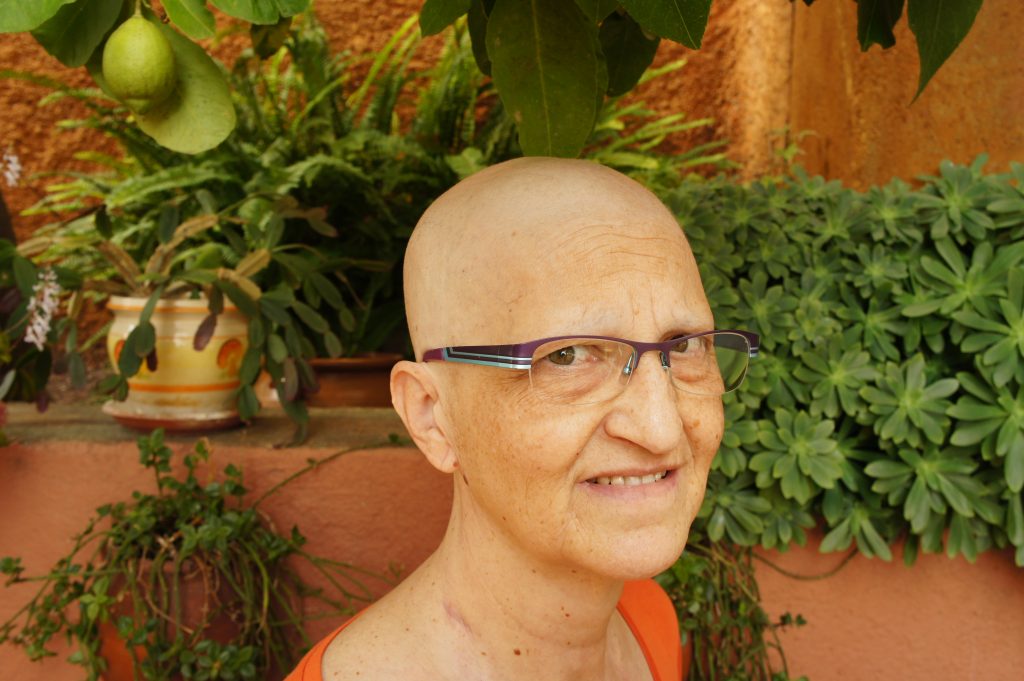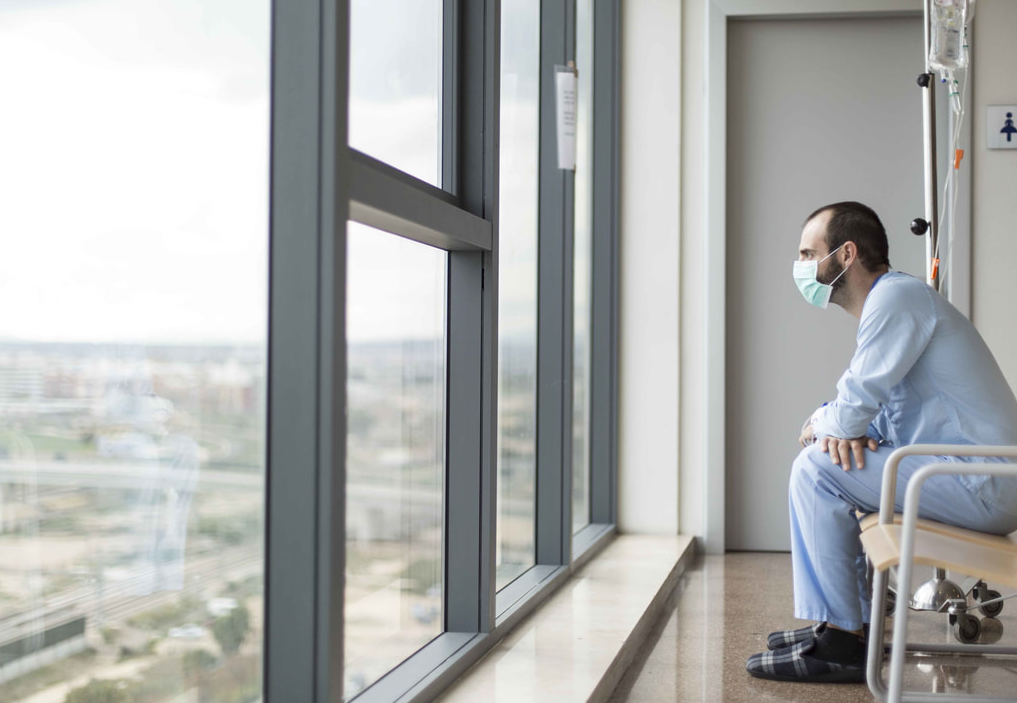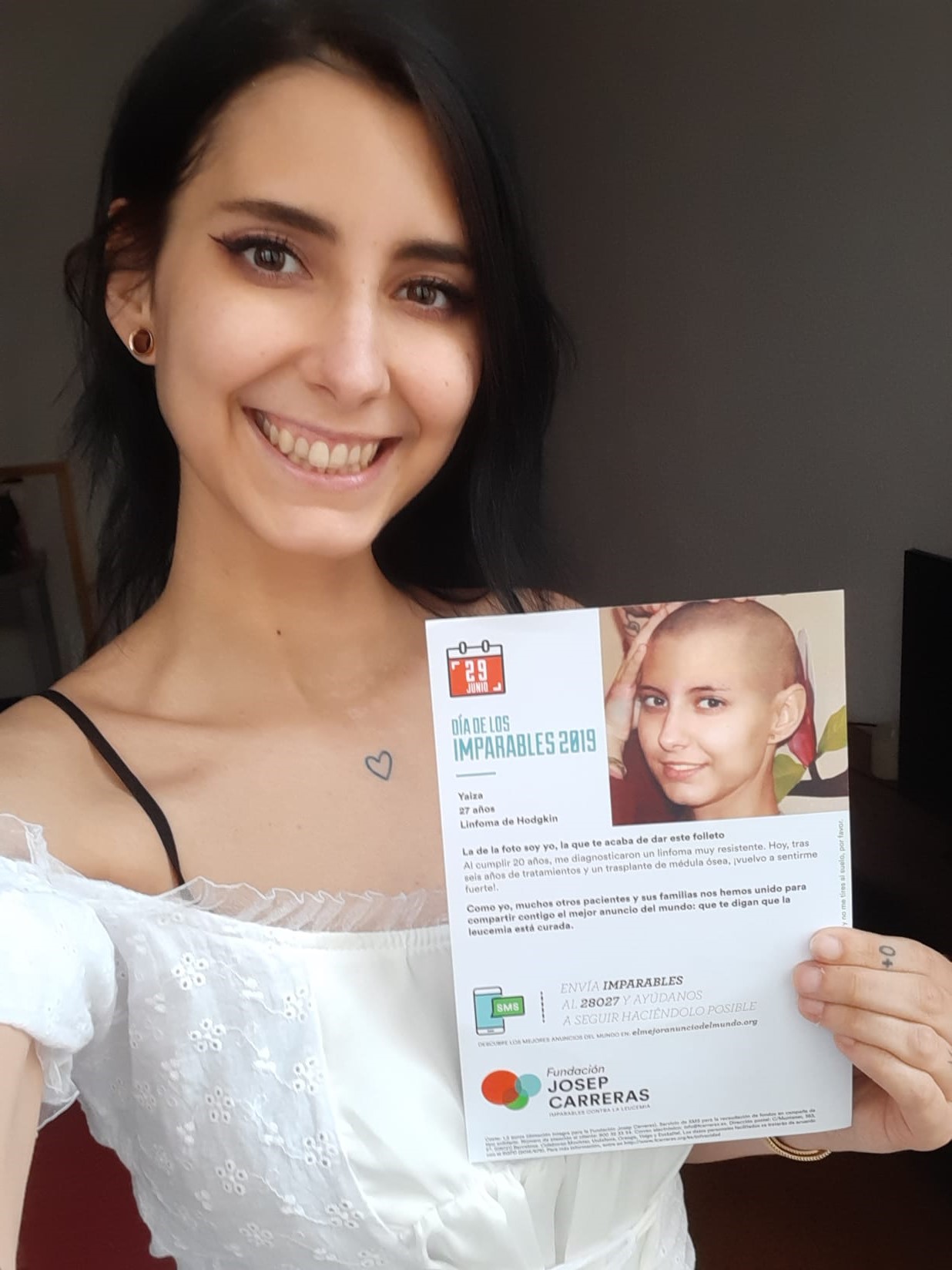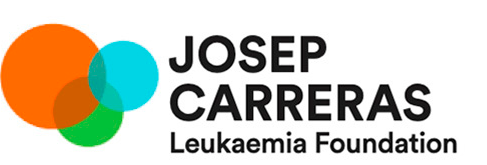Radiotherapy
Radiotherapy is a treatment regimen that uses different types and sources of ionising radiation to control or cure some tumours, as well as other diseases, by damaging cellular DNA so that cells lose their ability to divide or regenerate.
The information provided on www.fcarreras.org is intended to support, not replace, the relationship that exists between patients/visitors to this website and their physician.

What is radiotherapy and what is its purpose?
Cancer radiotherapy is used in high doses to destroy cancer cells or slow their growth by damaging their DNA. Cancer cells whose DNA is irreparably damaged stop dividing or die. When damaged cells die, they are broken down and discarded by the body.
Radiotherapy cannot completely damage cancer cells in a single session. Cycles are required in order to destroy or damage these cells. Afterwards, the cancer cells continue to die weeks or months after the end of radiotherapy treatment.
How is radiotherapy administered?
 In the vast majority of cases, radiotherapy is used in combination with other treatments, such as chemotherapy, immunotherapy or surgery.
In the vast majority of cases, radiotherapy is used in combination with other treatments, such as chemotherapy, immunotherapy or surgery.
Patients with haematological diseases requiring radiotherapy treatment usually receive a type of radiotherapy called external beam radiotherapy. In these cases, the treatment is administered by a machine that delivers ionising radiation to a predefined area in a fractionated manner, thus the patient has to attend one or more radiotherapy sessions each day during the course of the treatment. The machine is large and can be noisy. It does not touch the patient, but can move around the patient, sending radiation to a part of the patient’s body from many directions.
Radiation beams used in external beam therapy come from three types of particles: photons, protons and electrons. More information.
When radiotherapy is used as part of the conditioning for bone marrow transplantation or for some subtypes of leukaemia, it is usually administered to the whole body (total body irradiation), at a dose that varies from case to case (from 2 GY in a single day to 13 GY over several days). In this case, the patient will already be admitted to the hospital to receive the transplant.
External beam radiotherapy sessions are usually administered on consecutive days over 5 days. The duration of the cycles will depend on the type of cancer, the treatment goal, the radiation dose and the radiation schedule. The haematologist and radiotherapist will inform the patient about everything. If the radiotherapy is focused, one or more spots will be marked on the skin with a tattoo the size of a freckle to ensure that the patient is always in the same position
What are the side effects?
 The damage caused by radiotherapy to healthy cells is the cause of its side effects, which are usually associated with the area of irradiation. The most general are hair loss, skin changes and tiredness. Other side effects are more specific to the affected area, such as nausea, vomiting and diarrhoea in the case of abdominal irradiation and headache or swelling of the parotid glands in the case of head irradiation.
The damage caused by radiotherapy to healthy cells is the cause of its side effects, which are usually associated with the area of irradiation. The most general are hair loss, skin changes and tiredness. Other side effects are more specific to the affected area, such as nausea, vomiting and diarrhoea in the case of abdominal irradiation and headache or swelling of the parotid glands in the case of head irradiation.
Over time, once these cells have regenerated, these symptoms usually subside. It is important to remember that some side effects may be definite, such as infertility in case of irradiation of the reproductive organs, or may appear over a longer period of time (late effects), so it is important to be specifically informed before receiving this treatment.
What can and should you do if you receive radiotherapy?
It is very important that during treatment, for patients who receive it on an outpatient basis, they follow a healthy lifestyle, get enough rest, eat a varied and balanced diet (content in spanish), drink plenty of fluids, protect themselves from the sun and, in short, follow the recommendations of the haematologist and radiation oncologist.
On the day of your session, wear comfortable clothes and take warm clothes with you, as it can be cold in radiotherapy rooms. It is often uncomfortable or overwhelming because you can’t move. You might even learn some ways to relax? Here you can read up on a few of them.
Links of interest on other topics related to radiotherapy
Radiotherapy. Macmillan Cancer Support
Radiation Therapy to Treat Cancer. National Cancer Institute
Radiotherapy. Cancer Research UK
Links of interest: local/provincial or state entities that can provide you with resources and services specialised in leukaemia or cancer patients:
In Spain there is a large network of associations for haematological cancer patients that, in many cases, can inform you, advise you and even carry out certain procedures. These are the contacts of some of them by Autonomous Communities:
All these organisations are external to the Josep Carreras Foundation.
STATE
- AMILO (Asociación Española de Amiloidosis)
- AEAL (ASOCIACIÓN ESPAÑOLA DE AFECTADOS POR LINFOMA, MIELOMA y LEUCEMIA)
- AECC (ASOCIACIÓN ESPAÑOLA CONTRA EL CÁNCER). Present is the different provinces and in many municipalities. Contact with the nearest branch or call 900 100 036 (24h).
- AELCLES (Agrupación Española contra la Leucemia y Enfermedades de la Sangre)
- CEMMP (Comunidad Española de Pacientes de Mieloma Múltiple)
- Josep Carreras Leukaemia Foundation
- FUNDACIÓN SANDRA IBARRA
- GEPAC (GRUPO ESPAÑOL DE PACIENTES CON CÁNCER)
- MPN España (Asociación de Afectados Por Neoplasias Mieloproliferativas Crónicas)
ANDALUCÍA
- AECC (ASOCIACIÓN ESPAÑOLA CONTRA EL CÁNCER). Present is the different provinces and in many municipalities. Contact the nearest branch.
- ALUSVI (ASOCIACIÓN LUCHA Y SONRÍE POR LA VIDA). Sevilla
- APOLEU (ASOCIACIÓN DE APOYO A PACIENTES Y FAMILIARES DE LEUCEMIA). Cádiz
ARAGÓN
- AECC (ASOCIACIÓN ESPAÑOLA CONTRA EL CÁNCER). Present is the different provinces and in many municipalities. Contact the nearest branch.
- ASPHER (ASOCIACIÓN DE PACIENTES DE ENFERMEDADES HEMATOLÓGICAS RARAS DE ARAGÓN)
- DONA MÉDULA ARAGÓN
ASTURIAS
- AECC (ASOCIACIÓN ESPAÑOLA CONTRA EL CÁNCER). Present is the different provinces and in many municipalities. Contact the nearest branch.
- ASTHEHA (ASOCIACIÓN DE TRASPLANTADOS HEMATOPOYÉTICOS Y ENFERMOS HEMATOLÓGICOS DE ASTURIAS)
CANTABRIA
- AECC (ASOCIACIÓN ESPAÑOLA CONTRA EL CÁNCER). Present is the different provinces and in many municipalities. Contact the nearest branch.
CASTILLA LA MANCHA
- AECC (ASOCIACIÓN ESPAÑOLA CONTRA EL CÁNCER). Present is the different provinces and in many municipalities. Contact the nearest branch.
CASTILLA LEÓN
- ABACES (ASOCIACIÓN BERCIANA DE AYUDA CONTRA LAS ENFERMEDADES DE LA SANGRE)
- AECC (ASOCIACIÓN ESPAÑOLA CONTRA EL CÁNCER). Present is the different provinces and in many municipalities. Contact the nearest branch.
- ALCLES (ASOCIACIÓN LEONESA CON LAS ENFERMEDADES DE LA SANGRE). León.
- ASCOL (ASOCIACIÓN CONTRA LA LEUCEMIA Y ENFERMEDADES DE LA SANGRE). Salamanca.
CATALUÑA
- ASSOCIACIÓ FÈNIX. Solsona
- FECEC (FEDERACIÓ CATALANA D’ENTITATS CONTRA EL CÁNCER
- FUNDACIÓ KÁLIDA. Barcelona
- FUNDACIÓ ROSES CONTRA EL CÀNCER. Roses
- LLIGA CONTRA EL CÀNCER COMARQUES DE TARRAGONA I TERRES DE L’EBRE. Tarragona
- MielomaCAT
- ONCOLLIGA BARCELONA. Barcelona
- ONCOLLIGA GIRONA. Girona
- ONCOLLIGA COMARQUES DE LLEIDA. Lleida
- ONCOVALLÈS. Vallès Oriental
- OSONA CONTRA EL CÀNCER. Osona
- SUPORT I COMPANYIA. Barcelona
- VILASSAR DE DALT CONTRA EL CÀNCER. Vilassar de Dalt
VALENCIAN COMMUNITY
- AECC (ASOCIACIÓN ESPAÑOLA CONTRA EL CÁNCER). Present is the different provinces and in many municipalities. Contact the nearest branch.
- ASLEUVAL (ASOCIACIÓN DE PACIENTES DE LEUCEMIA, LINFOMA, MIELOMA Y OTRAS ENFERMEDADES DE LA SANGRE DE VALENCIA)
EXTREMADURA
- AECC (ASOCIACIÓN ESPAÑOLA CONTRA EL CÁNCER). Present is the different provinces and in many municipalities. Contact the nearest branch.
- AFAL (AYUDA A FAMILIAS AFECTADAS DE LEUCEMIAS, LINFOMAS; MIELOMAS Y APLASIAS)
- AOEX (ASOCIACIÓN ONCOLÓGICA EXTREMEÑA)
GALICIA
- AECC (ASOCIACIÓN ESPAÑOLA CONTRA EL CÁNCER). Present is the different provinces and in many municipalities. Contact the nearest branch.
- ASOTRAME (ASOCIACIÓN GALLEGA DE AFECTADOS POR TRASPLANTES MEDULARES)
BALEARIC ISLANDS
- ADAA (ASSOCIACIÓ D’AJUDA A L’ACOMPANYAMENT DEL MALALT DE LES ILLES BALEARS)
- AECC (ASOCIACIÓN ESPAÑOLA CONTRA EL CÁNCER). Present is the different provinces and in many municipalities. Contact the nearest branch.
CANARY ISLANDS
- AECC (ASOCIACIÓN ESPAÑOLA CONTRA EL CÁNCER). Present is the different provinces and in many municipalities. Contact the nearest branch.
- AFOL (ASOCIACIÓN DE FAMILIAS ONCOHEMATOLÓGICAS DE LANZAROTE)
- FUNDACIÓN ALEJANDRO DA SILVA
LA RIOJA
- AECC (ASOCIACIÓN ESPAÑOLA CONTRA EL CÁNCER). Present is the different provinces and in many municipalities. Contact the nearest branch.
MADRID
- AECC (ASOCIACIÓN ESPAÑOLA CONTRA EL CÁNCER). Present is the different provinces and in many municipalities. Contact the nearest branch.
- AEAL (ASOCIACIÓN ESPAÑOLA DE LEUCEMIA Y LINFOMA)
- CRIS CONTRA EL CÁNCER
- FUNDACIÓN LEUCEMIA Y LINFOMA
MURCIA
- AECC (ASOCIACIÓN ESPAÑOLA CONTRA EL CÁNCER). Present is the different provinces and in many municipalities. Contact the nearest branch.
NAVARRA
- AECC (ASOCIACIÓN ESPAÑOLA CONTRA EL CÁNCER). Present is the different provinces and in many municipalities. Contact the nearest branch.
BASQUE COUNTRY
- AECC (ASOCIACIÓN ESPAÑOLA CONTRA EL CÁNCER). Present is the different provinces and in many municipalities. Contact the nearest branch.
- PAUSOZ-PAUSO. Bilbao
AUTONOMOUS CITIES OF CEUTA AND MELILLA
- AECC CEUTA (ASOCIACIÓN ESPAÑOLA CONTRA EL CÁNCER)
- AECC MELILLA (ASOCIACIÓN ESPAÑOLA CONTRA EL CÁNCER)
Support and assistance
We also invite you to follow us through our main social media (Facebook, Twitter and Instagram) where we often share testimonies of overcoming this disease.
If you live in Spain, you can also contact us by sending an e-mail to imparables@fcarreras.es so that we can help you get in touch with other people who have overcome this disease.
* In accordance with Law 34/2002 on Information Society Services and Electronic Commerce (LSSICE), the Josep Carreras Leukemia Foundation informs that all medical information available on www.fcarreras.org has been reviewed and accredited by Dr. Enric Carreras Pons, Member No. 9438, Barcelona, Doctor in Medicine and Surgery, Specialist in Internal Medicine, Specialist in Hematology and Hemotherapy and Senior Consultant of the Foundation; and by Dr. Rocío Parody Porras, Member No. 35205, Barcelona, Doctor in Medicine and Surgery, Specialist in Hematology and Hemotherapy and attached to the Medical Directorate of the Registry of Bone Marrow Donors (REDMO) of the Foundation).
Become a member of the cure for leukaemia!


